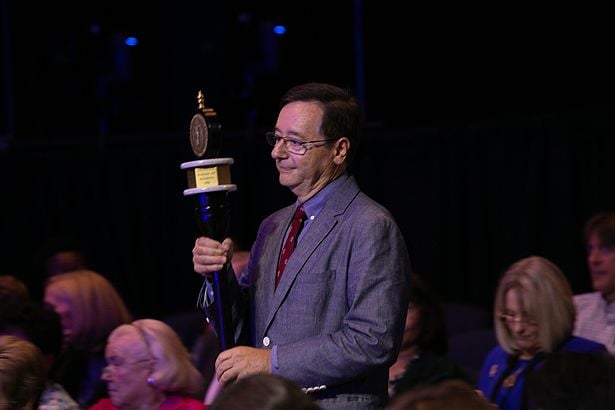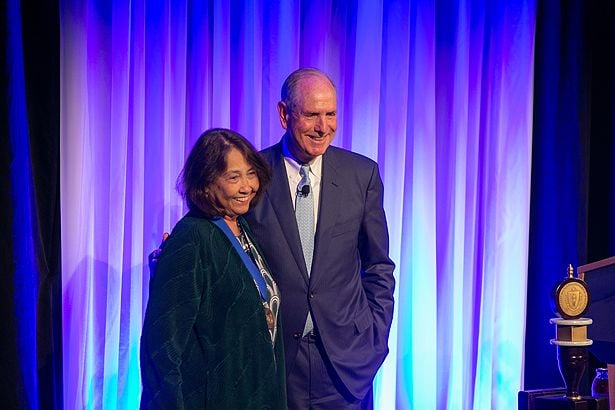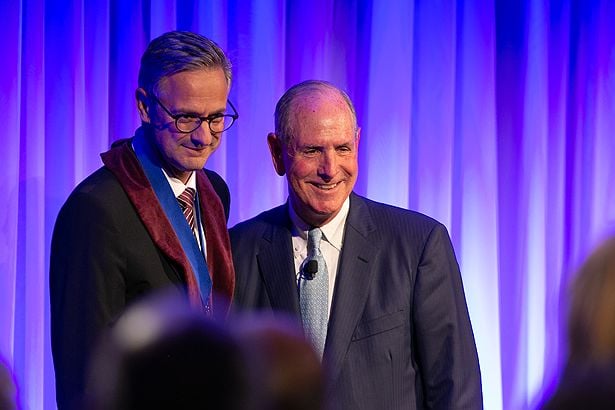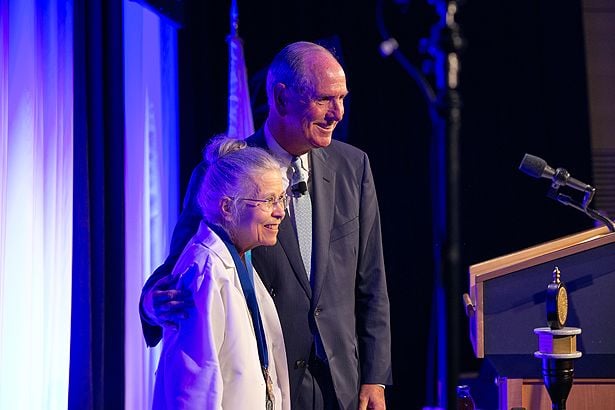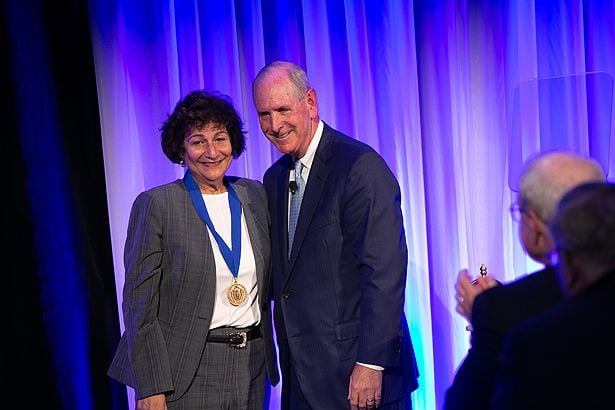In his annual Convocation address to the UMass Medical School community on Thursday, Sept. 12, Chancellor Michael F. Collins announced the creation of the UMMS strategic plan, “IMPACT 2025,” in which “our institution is poised to expand our reach and broaden our impact for the benefit of all.”
“The sheer breadth, depth and scope of the UMMS enterprise of today presents our medical school with a unique opportunity to do more, for more people, in more places,” Chancellor Collins said. “Our recent planning process underscored the deep and abiding passion among our academic community to be more thoughtful about the impact we create and the social mission we propagate. Moving forward, we will do just that.”
Collins said IMPACT 2025 will serve as an institutional blueprint that presumes foundational and core values—collaboration, diversity, public service, innovation and community engagement—will underpin the next five years of success. It envisions aligning and leveraging the full complement of expertise, resources and people within the UMMS enterprise, including Commonwealth Medicine, MassBiologics, UMMS Bridge, the university system and the clinical teaching affiliates, to “expand our reach, extend our presence and deepen our societal influence.”
“Most importantly, the plan calls for our emergence as a leading-edge medical school that measures institutional success through the lens of our social compact,” he said.
A highlight of the event was the awarding of Chancellor’s Medals to four distinguished faculty for their exemplary teaching, scholarship, clinical excellence and service at UMass Medical School.
Mai-Lan Rogoff, MD, professor of psychiatry, received the Chancellor’s Medal for Distinguished Teaching. As recipient of the recognition, Dr. Rogoff will receive the Manning Prize for Excellence in Teaching, a $10,000 gift made possible through the generosity of Donna and Robert J. Manning, chairman of the UMass Board of Trustees.
“Dr. Rogoff, for the more than 35 years you have taught at our medical school, you have been an educator who has influenced the careers of thousands of medical students,” Collins said. “With your pedagogical expertise, you have helped to create numerous courses, you have impacted multiple curricular innovation efforts and you have strived to help your learners appreciate the importance of maintaining their humanity and compassion while dealing with the challenges of their medical education.
Job Dekker, PhD, Howard Hughes Medical Institute Investigator, the Joseph J. Byrne Chair in Biomedical Research, professor of biochemistry & molecular pharmacology and co-director of the Program in Systems Biology, received the Chancellor’s Medal for Distinguished Scholarship. As recipient of the honor, Dr. Dekker will present the plenary lecture at the 20th Annual Research Retreat next month.
Collins said Dekker was described by his peers as an “unselfish collaborator,” an “intellectual leader,” and as one who “inspires loyalty in his collaborators.”
“Dr. Dekker, you have been described as ‘the world’s leading expert in understanding the organization of the genome in cell nuclei and mitotic chromosomes. [Your] “C” technologies . . . have revolutionized our understanding of genome packing, and now dominate discussions of nuclear and chromosome organization,’” Collins said. “Your approach called ‘Chromosome Conformation Capture, 3C demonstrated that many disparate regions of the genome are in close physical contact, thus providing insights into how genes are regulated by elements that can be located hundreds of kb away along the linear chromosome.”
Sarah Cheeseman, MD, professor of medicine, received the Chancellor’s Medal for Distinguished Clinical Excellence. As the recipient, Dr. Cheeseman will provide the keynote address at the 2020 White Coat Ceremony.
“Dr. Cheeseman, in your personal statement on patient care philosophy, you have spoken of the ‘philos’ for love and the ‘sophy’ for knowledge or wisdom that guided your patient care. Indeed, you reflected that ‘the love is there—both of medicine, the craft and the science (especially microbiology), and of the patients it has been [your] joy and privilege to care for and to learn from,’” Collins said. “Throughout your career, you have spurred on the aspirations of your student and resident learners and inspired your patients so that they could ‘live’ through the challenges of their disease with comprehensive, compassionate, and evidence-based medicine . . . with unequaled attention to detail and empathy, all the while, helping them to avoid any stigma because of their diagnosis.”
Matilde Castiel, MD, associate professor of medicine, received the Chancellor’s Medal for Distinguished Service. Dr. Castiel will carry the mace at university functions this year as “a fitting recognition for one who has so selflessly attended to the needs of our community over a lifetime of commitment and service.”
“Dr. Castiel, your life found its roots in Camaguey, Cuba, but your life’s work has been rooted in Worcester,” Collins said. “Throughout your medical career, you have ‘served as a community-based primary care physician, practicing in several unique and challenging venues in service to minority populations.’ With distinction, you have cared for your patients at the Family Health Center on Queen Street and been extraordinarily committed to elderly outreach for the Worcester Housing Authority.”
